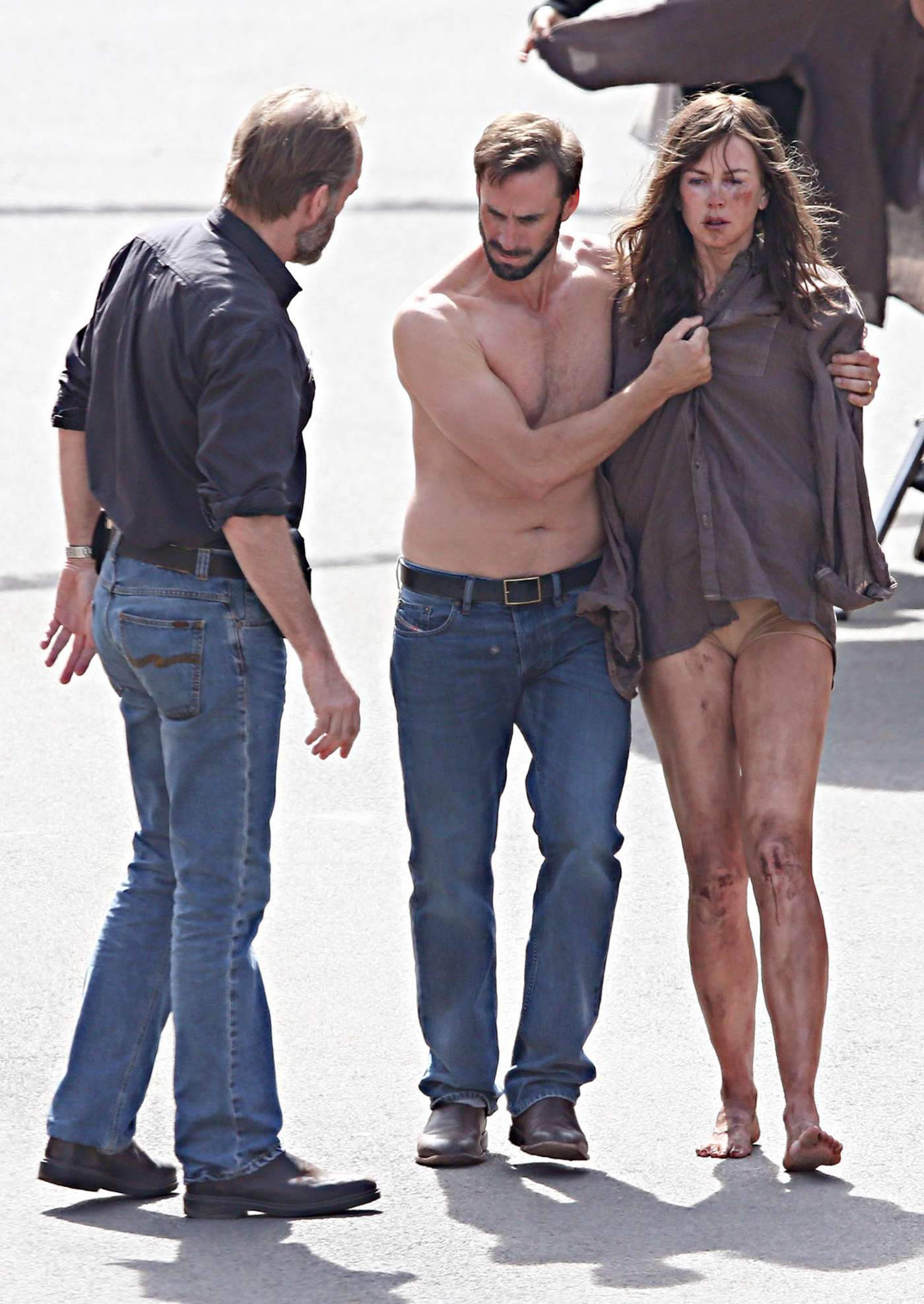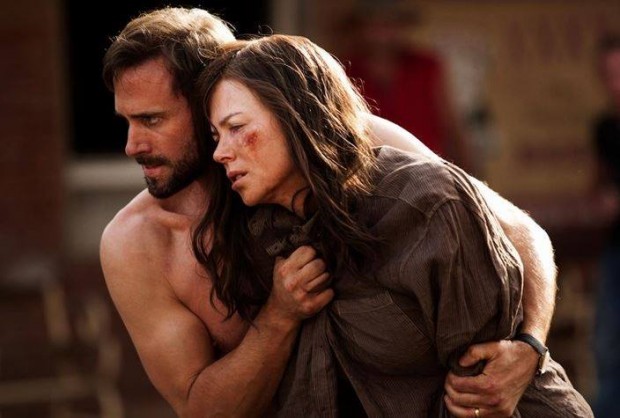Nathaniel reporting from Park City
 Weaving, Fiennes, and Kidman on the set of "Strangerland"There are a lot of things that are unclear in Strangerland, secrets covered as they are in beautifully dangerous sandstorms, the warped image shimmer brought on by desert heat, and the nightmare visions of Catherine Parker (Nicole Kidman) a bored sexless wife and mother who can't sleep well since her new home lacks air conditioning. Soon her lack of sleep and her indifferent husband Matthew (Joseph Fiennes) will be the least of her worries as her children vanish into the night in the unfamiliar desert town her family's just moved to due to ____ [insert withholding of family secrets here].
Weaving, Fiennes, and Kidman on the set of "Strangerland"There are a lot of things that are unclear in Strangerland, secrets covered as they are in beautifully dangerous sandstorms, the warped image shimmer brought on by desert heat, and the nightmare visions of Catherine Parker (Nicole Kidman) a bored sexless wife and mother who can't sleep well since her new home lacks air conditioning. Soon her lack of sleep and her indifferent husband Matthew (Joseph Fiennes) will be the least of her worries as her children vanish into the night in the unfamiliar desert town her family's just moved to due to ____ [insert withholding of family secrets here].
What's also unclear is the poetic narration that begins the film and repeats throughout it.
Touch me in the night. No one can see"
Is it the daughter's voice? And why does it keep repeating throughout the film? And what kind of sexual touch are we talking about? That's actually important given the specifics of this narrative. [More...]
And what does this poetic diary serve other than a disembodied reminder of Lily Parker's (Maddison Brown) insatiable sex drive. Catherine and Matthew's teenage daughter is out of control, and not above sleeping with the first guy who approaches her at the local skate park in a dirty storage unit called "The Box"
I don't intend to spoil the film -- most of what I'm talking about happens very early in the film -- but it's quickly clear that Lily is sexually troubled and promiscuous and hates her parents. In one of the film's tenser moments, the parents face off about their daughter's behavior and Matthew lets out an angry
She didn't get it from me."
In Nicole Kidman's quest to become the English-language Isabelle Huppert -- she's got the red hair, the auteur lust, and a similar taste for disturbed women -- she's playing a sexually aggressive woman who we quickly learn was once quite a wild child before she settled down with her stuffy handsome pharmacist. Now they sleep in separate rooms and he ignores her. When their introverted son and rebellious daughter go missing Catherine begins to act out, Matthew clams up, and the local detective David (Hugo Weaving) who initially thinks this is a teen runaway situation, begins to suspect foul play.
Strangerland has mood to spare but apart from Kidman's typically strong performance (its grabby provocative work if not nearly as coherently delineated as the two roles that it arguably fuses: the grieving mother of Rabbit Hole and the slutty hairdresser in The Paperboy) and Weaving's strong support, it's tough to recommend. Joseph Fiennes has the most trouble with his character, but in fairness, he has the toughest role. The screenplay intends, I'm sure, to be artfully ambiguous. Fiennes attempts to sell that rather beautifully in one particular scene ("Did I?" he says repeating a horrible accusation) but the writing of his character especially is so schizophrenic as to make the role impossible. In one scene he's like the devil, in the next, a dutiful husband with an exhausting unhinged wife, in the next an ogre, then a sensitive father. Repeat.
All told Strangerland doesn't have an awful lot going for it beyond its love of ominous moods, eye-catching desert landscapes (the film was shot by P.J. Dillon, best known for his cinematography on Vikings the TV series) and Kidman and Weaving, though to be fair the ending is more satisfying plot and emotion wise than I thought was possible given the red herring incoherency. For a while I worried I was missing something until the mirage like beauty gradually unmasked itself as total evasiveness. What is the movie trying to say or is it just trying to achieve peak ambiguity without the Malick or Kubrick level skill set it'd require to make a movie that's all mood and no reveal? The film comes from first time feature director Kim Farrant. Given a few strong scenes and the distinctly feminine sexual voice (always welcome and in short supply behind the camera) I'd love to see a second film, but I fear the first was far too ambitious for a debut.
Grade: C/C+
